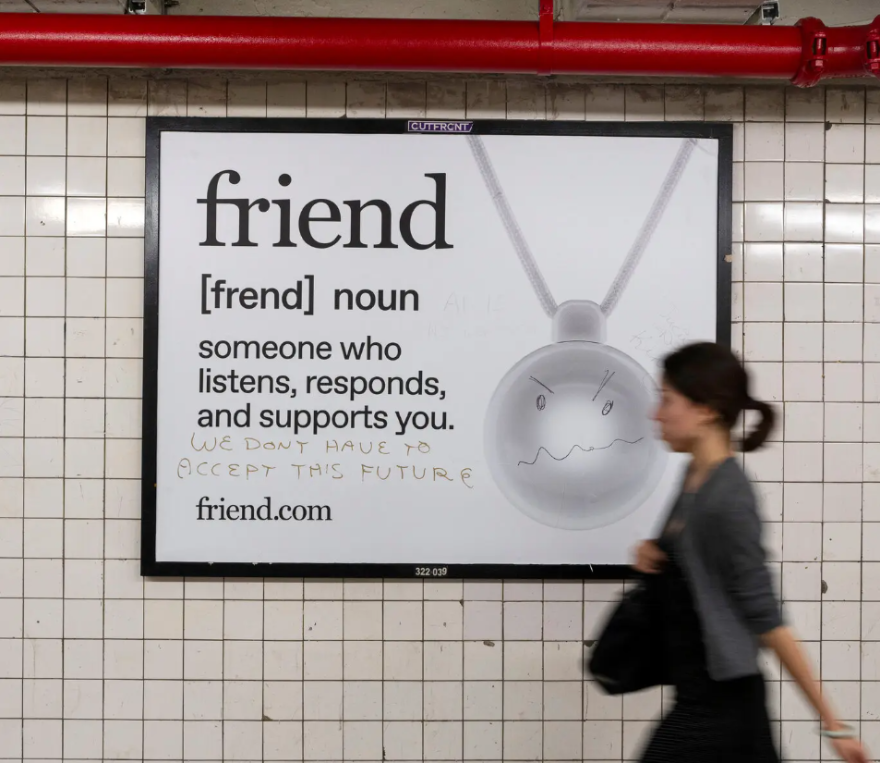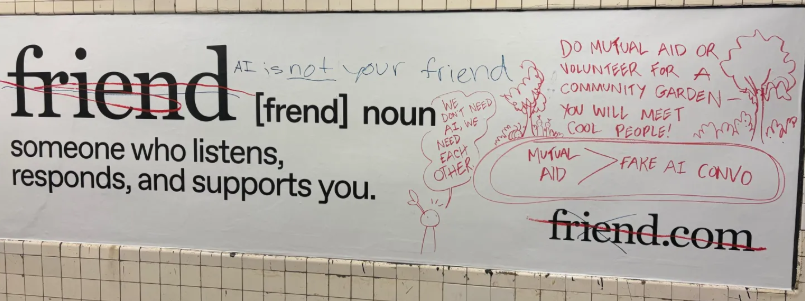AI IS NOT YOUR FRIEND

There are few things more fulfilling in life than feeling like you're being listened to. Like your thoughts, emotions, and opinions are valid; like your existence is worthwhile. So, what if you had someone around who would always listen, whose existence served only one purpose - to be your friend?
This question was posed - and answered - by 22-year old CEO and Harvard dropout Avi Schiffman through his unveiling (and relentless advertisement) of the AI chatbot, friend. The million-dollar ad campaign was plastered throughout New York City and featured the tagline, "friend. someone who listens, responds, and supports you". The "friend", in this instance, is a microphone necklace that dictates your speech and feeds it into an AI algorithm which responds to you through an associated app. In other words, it's a glorified surveillance device which preys upon loneliness in one of the most populated cities in the world.
The campaign received severe backlash and was widely graffitied, more than once with the line, "AI wouldn't care if you lived or died". Schiffman has since insisted that him and his marketing team intended for this outrage to be spurred, writing in a response to someone on X (formerly Twitter), "Why do you think I left so much white space?"

The campaign and its subsequent backlash illustrate a developing pattern between the general public and the profiteers of AI platforms. The same billionaires who make money off of our collective addiction to social media are also investing heavily in the integration of artificial intelligence into their platforms (e.g. Grok, Meta AI, Gemini, etc.). Aside from the integration of AI into existing platforms, friend is one of many AI "companion" apps, such as Character.AI and Replika which directly prey upon people's cravings for attachment and companionship, and ultimately only serve to further isolate and detach them from real connection. It's not shocking that LLM models such as ChatGPT and Deepseek have also been adapted to serve the same purpose.
It's also not surprising that loneliness has been on the rise. In the wake of COVID-19 and amidst increased reliance on technology and cost of living, communities are more prone to fracture and existing relationships are strained. In 2022, 49.63% of adults in the UK reported feeling lonely occasionally, sometimes, often or always. Studies show that young people and teenagers are the most affected, with many declaring us as being in a "loneliness epidemic". The recent astounding investments in artificial intelligence make an escalation of the situation seem inevitable, as people turn increasingly towards AI models like ChatGPT, not only as sources of information, but also as sounding boards and, predictably, companions. This substitution of human connection for artificiality ultimately does nothing but pad the pockets of those who work to exacerbate and profit off of our loneliness.
This story, however, is one of enduring humanity. Despite the supposed intentionality of the advertising backlash, the ad campaign has inspired an insurgence of people emphasising the importance of real friends.

A real friend has thoughts, emotions, and opinions of their own. A real friend will listen, respond, and support you - and expect the same back. It is the interdependence of human connection which makes real friendships what they are: a tapestry of late nights out and inside jokes and proper good hugs. But most of all, it is - as it always is - about love.
So, for the sake of humanity, tell your friends you love them.